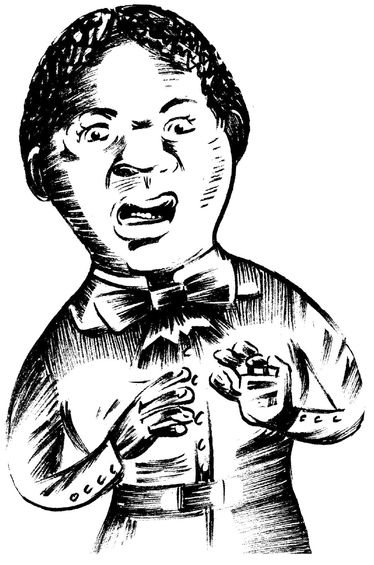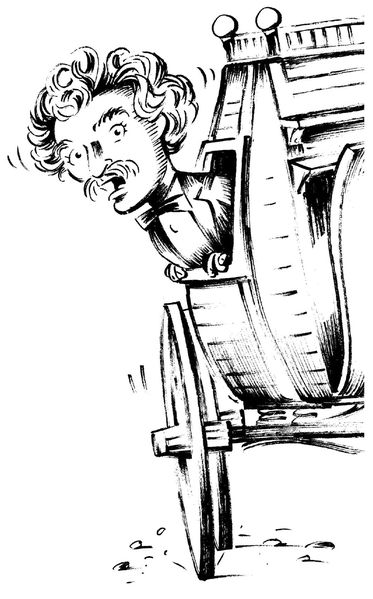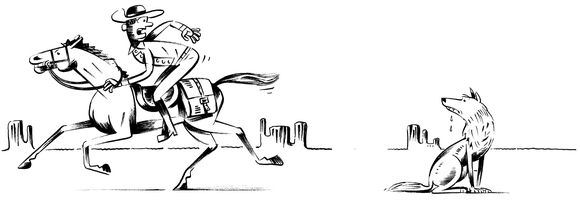Which Way to the Wild West? (10 page)
Read Which Way to the Wild West? Online
Authors: Steve Sheinkin

O
thers decided to settle in California. This was easier said than done, for some.
thers decided to settle in California. This was easier said than done, for some.
Biddy Mason and her three young daughters wanted to stay. Unfortunately for them, Robert Smith was determined to leave. Smith
held the Mason family as slavesâeven though California had joined the Union as a free state in 1850.
held the Mason family as slavesâeven though California had joined the Union as a free state in 1850.
By 1855 Smith realized that Biddy Mason knew slavery was illegal in California. That's when he announced it was time to move to Texas (where slavery was legal). Mason had no intention of going. She contacted free black friends in Los Angeles and told them her story. The friends went to a local judge, who agreed to hear her case.
In a courthouse packed with curious spectators, Robert Smith tried to claim that Mason and her daughters weren't really slaves. He treated them just like family, he insisted.
Mason saw things differently, as she told the judge:
“I always feared this trip to Texas, since I first heard of it. Mr. Smith told me I would be just as free in Texas as here.”
She didn't believe that. Neither did the judge, who ruled that Mason and her daughters were free and could live wherever they wanted. They joined the growing black community in Los Angeles.
Biddy Mason

B
iddy Mason was one of thousands who chose to stay and build a future in California. By 1860 the state population would zoom toward 400,000.
iddy Mason was one of thousands who chose to stay and build a future in California. By 1860 the state population would zoom toward 400,000.
California's quick growth was one major effect of the gold rush. Another effect: many of the miners who caught gold fever were never really cured. As they headed back home, they couldn't help themselvesâthey kept looking for gold.
That's what George Jackson was doing in the Rocky Mountains in January 1859. It was much too late in winter to be out in these snowy mountains, but Jackson had heard rumors of gold being spotted in the area. He decided to search for one more day before heading back to Denver (which then had a total of twenty buildings).
He found a promising-looking spot along Clear Creek. The dirt was frozen so solid, he had to build a fire on top of it before he could scoop some into his drinking cup. He swirled the cup around, slowly splashing out the dirt and water. Soon all that remained in the bottom of his cup was about an ounce of gold flakes.
“I went to bed and dreamed of riches galore,” Jackson said. “I had struck it rich! There were millions in it!” News of Jackson's find set off a whole new gold rush, as more than 100,000 people raced to the Rocky Mountains of Colorado. And Jackson was right, there were millions of dollars of gold in those hills. Actually, there were hundreds of millions (though Jackson sold his mine for just a few thousand).
From Colorado, hopeful miners fanned out all over the West. It was “a mad, furious race for wealth,” one miner said. In June 1859 the furious race led a miner named Henry “Old Pancake” Comstock to a rocky hillside in the desert of western Nevada.
Comstock got his nickname because he was too lazy to bake bread
and always used his flour to fry piles of pancakes. But Old Pancake was feeling energetic on this day. It paid offâhe stumbled onto one of the biggest mineral strikes in world history. Or, more precisely, he stumbled onto two Irish immigrants who had already found the spot. Comstock liked the looks of it, so he started shouting that the land was his. He was so loud and annoying that the Irish guys finally agreed to make him a partner.
and always used his flour to fry piles of pancakes. But Old Pancake was feeling energetic on this day. It paid offâhe stumbled onto one of the biggest mineral strikes in world history. Or, more precisely, he stumbled onto two Irish immigrants who had already found the spot. Comstock liked the looks of it, so he started shouting that the land was his. He was so loud and annoying that the Irish guys finally agreed to make him a partner.
The men spent a few weeks digging, finding several ounces of gold a day. They could have gotten even more if it weren't for the heavy bluish sand that kept caking to their boots and shovels. They were constantly stopping to scrape the stuff off and toss it aside.
Finally someone decided to bring a bit of this irritating sand to a nearby town to find out what it was. The answer: nearly pure silver. This sparked yet another rush, this time to the desert of Nevada. Miners founded the booming town of Virginia City. And Old Pancake's mine, which became known as the Comstock Lode, produced four hundred million dollars in silver and gold over the next thirty years.
O
ne of the thousands racing to Nevada was a young man from Missouri named Samuel Clemens.
ne of the thousands racing to Nevada was a young man from Missouri named Samuel Clemens.
Clemens traveled by stagecoach, which was by far the fastest way to cross the West. By stopping often at stations to trade tired horses for fresh ones, stagecoaches could get you from St. Louis to San Francisco in just twenty-five days (compared to the four months it took people who traveled in their own wagons).
Clemens did point out some drawbacks, however. Passengers were quickly coated with dust and bugs. And Clemens and the other passengers sat facing each other on benches, packed so tightly that knees bumped. This was only a little painful on smooth sections of road. But when they hit holes and rocks (which were everywhere), passengers smashed together and sent each other flying.
“First we would all be down in a pile at the forward end of the stage, nearly in a sitting posture, and in a second we would shoot to the other end, and stand on our heads.”
Samuel Clemens

Bags of mail, luggage, loose books, pipes, canteens, even pistols, went flying around the car. People shouted:
“Can't you quit crowding?”
“Take your elbow out of my ribs!”
This continued day and night for more than three weeks. Passengers could get out
for only about twenty minutes at a time, when the coach stopped at a station to change animals.
for only about twenty minutes at a time, when the coach stopped at a station to change animals.
Clemens survived the journey and immediately started searching for silver and gold. And as he later wrote in his book
Roughing It
(full of great stories and great exaggerations) he and two friends really did find a rich mine. So rich, in fact, that one of the partners was offered $200,000 (about $3 million in today's money) for his shareâand he refused it!
Roughing It
(full of great stories and great exaggerations) he and two friends really did find a rich mine. So rich, in fact, that one of the partners was offered $200,000 (about $3 million in today's money) for his shareâand he refused it!
Much too excited to sleep, Clemens and his partner Calvin Higbie spent the night dreaming of how to spend their fortunes.
Clemens:
Cal, what kind of house are you going to build?
Cal, what kind of house are you going to build?
Higbie:
I was thinking about that. Three-story and an attic.
I was thinking about that. Three-story and an attic.
Clemens:
But what kind?
But what kind?
Higbie:
Well, I don't hardly know. Brick, I suppose.
Well, I don't hardly know. Brick, I suppose.
Clemens:
Brickâbosh.
Brickâbosh.
Higbie:
Why? What is your idea?
Why? What is your idea?
Clemens:
Brownstone frontâFrench plate glassâbilliard room off the dining roomâstatuary and paintings â¦
Brownstone frontâFrench plate glassâbilliard room off the dining roomâstatuary and paintings â¦
Higbie:
By George!
By George!
According to the law, the finder of a mine had ten days to start working at the site. If he didn't do any work in that time, he lost his claim. Higbie had to help on another job for a few days, but he left a note for Clemens: “Don't fail to do the work before the ten days expire.”
Clemens never saw the note. The next morning he heard a friend was very sick and hurried off to help. He left a note for Higbie, telling Higbie to start the work without him.
The third partner, meanwhile, thought the other two were starting the work.
When Clemens got back to their cabin ten days later, he saw Higbie inside, slumped in a chair, looking stunned.
“Higbie, whatâwhat is it?”
“We're ruined,” Higbie said. “We didn't do the work.”
The ten days had passed. The land was now open to the public again. Other miners were already digging there.
“I was absolutely and unquestionably worth a million dollars, once, for ten days,” Clemens later said.
“W
hat to do next?” Clemens wondered. Like so many failed miners, he was ashamed to go back home with nothing to show for his efforts. He thought about the jobs he had done since he was thirteen.
hat to do next?” Clemens wondered. Like so many failed miners, he was ashamed to go back home with nothing to show for his efforts. He thought about the jobs he had done since he was thirteen.
“I had once been a grocery clerk, for one day,” he remembered, “but had consumed so much sugar in that time that I was relieved from further duty.”
He had worked in a bookstore, but didn't like it. Customers kept bothering him while he was trying to read. He had been a blacksmith, law student, drugstore clerk, printer, riverboat pilot â¦
The one thing he actually enjoyed was writing funny stories. Since coming west he had sent some stories to Nevada newspapers. Much to his shock, they printed them. Just as Clemens was thinking this over, he got a letter from a Virginia City paper offering him work as a reporter. He took the job. Just for fun, he started signing his articles with the name Mark Twain.
This kind of thing was happening a lotâpeople kept coming west to search for gold, failing, and deciding to stay anyway. They found new jobs, started new businesses, built new towns.
That didn't mean life was easy in the West. One of westerners' main complaints was that they felt cut off from the rest of the United States. It took months for mail and news to travel from the East to the West. Whenever a ship with mail finally arrived in San Francisco, thousands rushed to the post officeâoften with blankets under their arms. They knew they could be waiting outside for days while post office clerks sorted through the mail. Merchants came along selling coffee and sandwiches. Others earned extra cash by waiting in line until they got close to the post office entrance, then selling their spot to the highest bidder.
Things were getting ridiculous. There had to be a faster way to get letters and news across the country. Someone in the government had the idea of importing camels from Saudi Arabia, loading them with mail sacks, and leading them across the deserts of the West. The camels were not pleased. First the rocky roads ripped up their hooves. Then mail carriers tried tying leather boots on the camels' feet.
Soon after this unfortunate experiment, a group of stagecoach owners introduced a better mail delivery service. They called it Russell, Majors & Waddell's Central Overland California & Pike's Peak Express Company.
Luckily for them, customers came up with a catchier name: the Pony Express.

Other books
Jilted: Promise Harbor, Book 1 by Kelly Jamieson
Desire Me Always by Tiffany Clare
Herring on the Nile by L. C. Tyler
MrBigStuff-epub by RG Alexander
Ejecta by William C. Dietz
In Cold Pursuit by Sarah Andrews
Pieces of Broken Time by Lorenz Font
RiskingEternity by Voirey Linger
PsyCop 2: Criss Cross by Jordan Castillo Price
The Billionaire's Surrogate: A BWWM Pregnancy Love Story by Cher Etan, BWWM Club
